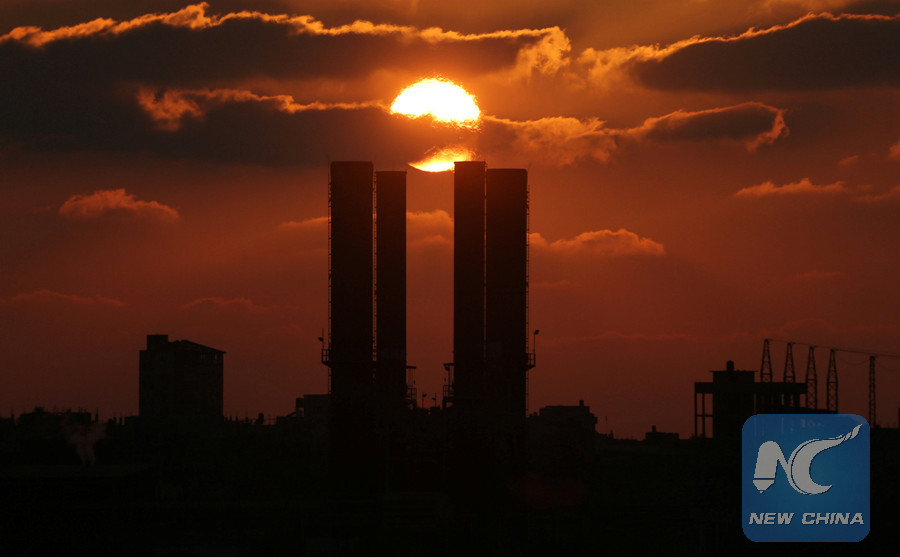
The Gaza power plant is seen during sunset in the central Gaza Strip August 10, 2017. (REUTERS photo)
GAZA, Aug. 21 (Xinhua) -- The power crisis in the Gaza Strip, which has worsened since mid-April, creates additional difficulties for 46-year-old Gaza teacher and housewife Amal Nasrallah, to manage her family's daily needs.
The severe power shortage, that usually lasts for hours during day and night, makes it impossible for Nasrallah to store any freshly made food and meals that she prepares in advance for her family of six.
Nasrallah has to do extra housework to shop for materials for meal preparation on a daily basis, to prevent the food from quickly spoiling.
"The worsening power crisis has negatively affected all aspects of our lives and our daily schedule, especially the habits of purchasing and preparing food," she complained in an interview with Xinhua.
She said that the various food items stored in the refrigerator had gone bad in the past few days as the electric appliance only works for a limited number of hours.
Raneen al-Rifi, housewife of a five-member family, used to go to the market almost once a week to buy vegetable, fruits and meat, and store them to be ready for daily use.
The power crisis has forced her to change her shopping habit, especially at the hottest days of summer when food went damaged without electricity.
Rifi noted that she now had to purchase materials for only one meal per day and the minimum amount of fruit, and her family have to consume the food quickly before it spoiled soon without proper storage.
The Gaza Strip has been under a severe electricity shortage since mid-April due to a sharp decline in the work of its only power station and Israel's reduction of about a third of the electricity supply to the coastal enclave.
According to the Palestinian Hamas-run Energy Corporation in Gaza, the quantity of electricity available to the enclave "does not exceed 100 megawatts out of the more than 500 megawatts needed on a daily basis." The corporation officials said this situation makes electricity crisis at its worst in several years.
As a result of the deficit, the Gaza Electricity Distribution Company (GEDCO) relies on an emergency schedule of less than three hours of electricity per day.
Gaza traders and merchants said the worsening power has already caused deterioration in the trade in Gaza local markets.
Saad Bedair, who runs a food store in central Gaza City, told Xinhua that the reduction of household purchases of goods causes them more losses.
Goods such as frozen products, milk and cheese are usually bought enough for about a week in the past, but because of the electricity crisis, families had reduced their purchases to the minimum possible quantity and had stopped buying some items, he added.
The power cutoff for long hours has also led to deterioration of local economic development, which depends on the mechanism of electricity production.
A number of factories have stopped operation, as the crisis caused an increase in the production costs as well as a decline in production capacity, especially for industries that demand continuous electricity supply.
Ghazi Mushtaha, an ice cream factory owner told Xinhua that their production fell this summer by more than 95 percent due to the power shortage.
He explained that electricity has been available for less than three hours every 24 hours in the past several months, which does not help either to produce or store his products.
"This year is the worst for our work because of the lack of electricity in production and storage," said Mushtaha, who founded his factory 40 years ago, "Even if they provide electricity for production, we cannot sell the ice cream to shops that do not have permanent electricity for storage."
He pointed out that the declined revenues affected more than 70 workers and more than 40 distributors of his factory, along with hundreds of retailers, which increases the unemployment rate and poverty level already aggravated in the Gaza Strip.

